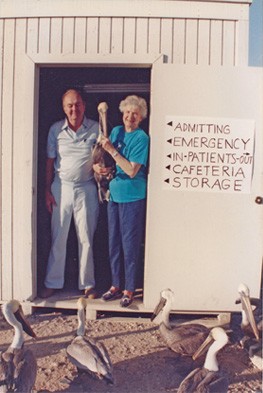How it began
Pelican Harbor Marina and nearby Bird Key have long been magnets for seabirds and shorebirds in Miami. Back in 1980, Harry and Darlene Kelton moved their houseboat to the Marina and saw an injured brown pelican.
Despite having no experience in animal care, they removed a fishhook from his mouth and nursed him back to health. So was born the Pelican Harbor Seabird Station.
Over time, others joined the cause to rehabilitate then-endangered brown pelicans: veterinarian Jim McCoy volunteered his time, the Miami Dade Parks Department provided land and, in 1992, Miami Dade County built the current station.
In 1993, Wendy Fox moved to Miami and began volunteering, bringing her son Brian along. By 2001, she had become Director and President of the Board, following Harry’s retirement and Darlene’s passing. The mandate and reach of the center grew, along with its operations. Wendy became President of the National Wildlife Rehabilitators Association, and at the time Harry also served as the Vice President of the International Wildlife Rehabilitation Council.
Harry & Darlene Kelton are posing in the first Seabird Station, a large tool shed.
The Station has developed into a leader in brown pelican care, with Wendy training rehabilitators in the U.S. Virgin Islands, and the Station staff rehabilitating pelicans contaminated in the Deepwater Horizon oil spill.
A dedicated advocate for pelicans and all wildlife was lost in August 2011 when Wendy succumbed to cancer. As a testament to her love and concern for the Seabird Station and its mission when Wendy felt she could no longer fulfill her duties, she stepped down only after ensuring her son Brian would move back home and continue the work as executive director.
Under the leadership of Brian Fox, the Station maintained its focus on seabirds and shorebirds, primarily the brown pelican. He focused on increasing the quality of animal care and upgrading the facilities. With this in mind, he hired Jessica Cline, an experienced wildlife rehabilitator with a degree in biology to run the clinic. When Brian left to pursue other interests Jessica was appointed Interim Director. She continued to emphasize animal care, and instituted an in-house training program for staff, interns, and volunteers.
In the fall of 2014, Christopher Boykin joined the team as Executive Director. During his time he doubled the operating budget and expanded staff to accommodate increased patient loads. He also devoted efforts to increasing our community presence and expanding our donor network alongside then Assistant Director, Chloe Chelz, prior to stepping down in December 2023.
In 2024, Chloe Chelz was sworn in as Executive Director, and now leads the organization through its most exciting period of change in decades. In November 2024, Pelican Harbor Seabird Station broke ground its new Wildlife Hospital and Education Center. This new property, located along the Little River within minutes of the original location, is 14 times larger, and will feature more ambassador and rehabilitation pens, an Education Center, natural history exhibits, and a manatee viewing location.
There is still significant work to be done in the future: to reduce further seabird injuries caused by human activity, to expand education and conservation efforts for urban wildlife in South Florida, and to raise funds to secure the future of Miami’s native wildlife.






